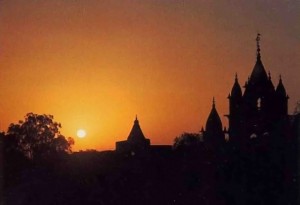 Reportedly someone once asked Gandhi, “What do you think of Western civilization?”
Reportedly someone once asked Gandhi, “What do you think of Western civilization?”
He quipped, “I think it would be a good idea.”
Another time he observed, “The real strength of India [of the age-old Vedic civilization] lies in her villages.”
It used to be easy for us New Yorkers and Londoners and Chicagoans and Parisians to shrug off remarks like these. (“What do those people know, anyway?”)
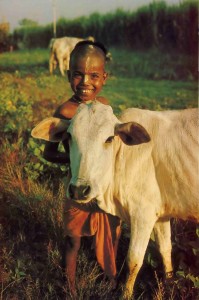 It used to be easy, until people like Dr. Theodore Roszak and E.F. Schumacher (a British economist, no less) pointed to corruption and pollution and started writing books like Where the Wasteland Ends and Small Is Beautiful—telling us what those people knew all along.
It used to be easy, until people like Dr. Theodore Roszak and E.F. Schumacher (a British economist, no less) pointed to corruption and pollution and started writing books like Where the Wasteland Ends and Small Is Beautiful—telling us what those people knew all along.
“The cultivation and expansion of needs,” says Schumacher, “is the antithesis of wisdom…the antithesis of freedom and peace. Every increase of needs tends to increase one’s dependence on outside forces over which one cannot have control, and therefore increases existential fear. Only by a reduction of needs can one promote a genuine reduction in those tensions which are the ultimate cause of strife and war.”
The people on these pages make use of simple technology—things that really save time and labor. They just don’t care for technology that saves you little and enslaves you a lot. They have enough of everything, but over profit margins and migraine headaches they prefer peace of mind and freedom of soul.
This man (above left) runs only one store (not a chain of them) and he just does what he can to keep it well-stocked with grapes, mangoes, persimmons, oranges and other things for his village’s people. Mother nature does the rest (and seems to be doing fairly well). Perhaps this abundance isn’t so surprising, since from childhood to old-age these people absorb themselves in God-conscious culture. The young lad (top) is holding an ektar, a one-stringed gourd instrument. During his lifetime he’ll have all kinds of cultural experiences, from drum-playing and drawing to study and self-realization. When he’s as old as the old gentleman (above) his life will still be unfolding.
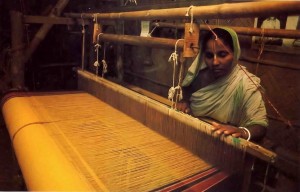 These people sometimes use simple gadgets; it’s just that they don’t let the gadgets use them. With his spinning wheel (below, left) this man makes raw cotton, wool, or silk into thread. With her handloom (right) this lady makes thread into fabric. (Here, in fact, she’s fashioning a sari. The decorative borders call for exquisite craftsmanship.)
These people sometimes use simple gadgets; it’s just that they don’t let the gadgets use them. With his spinning wheel (below, left) this man makes raw cotton, wool, or silk into thread. With her handloom (right) this lady makes thread into fabric. (Here, in fact, she’s fashioning a sari. The decorative borders call for exquisite craftsmanship.)
Finally, the tailor (below, right) takes the fabric plus his tape measure, pencil, scissors, and needle and thread (maybe a sewing machine, too) and makes you a custom shirt or jacket, or whatever. All this without smokestacks or punch clocks or shutdowns or markups. Things are plain and simple, and peaceful.
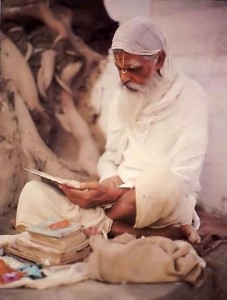 This man (right) is an intellectual, though he may or may not be able to tell you about Newtonian physics. He studies the ancient Vedic literatures, which answer questions like “Who are we really?” “Why are we here?” and “Where are we going when we leave?”
This man (right) is an intellectual, though he may or may not be able to tell you about Newtonian physics. He studies the ancient Vedic literatures, which answer questions like “Who are we really?” “Why are we here?” and “Where are we going when we leave?”
As we’ve seen, the Vedic civilization (the “wisdom civilization”) rests upon the cow and bull (rather than the slaughterhouse and factory) and upon the real intellectual (the man of wisdom). Here Mr. Schumacher makes a comment: “The neglect, indeed the rejection, of wisdom has gone so far that most of our intellectuals have not even the faintest idea what the term could mean. As·a result, they always tend to try and cure a disease by intensifying its causes. The diseases having been caused by allowing cleverness to displace wisdom, no amount of clever research is likely to produce a cure… Wisdom can be found only inside oneself…We are suffering from a metaphysical disease, and the cure must therefore be metaphysical.”
People like the one pictured here can tell us the cure. They and the Vedic literatures they study recommend chanting the Hare Krishna mantra and living simply-for freedom, peace, and wisdom.

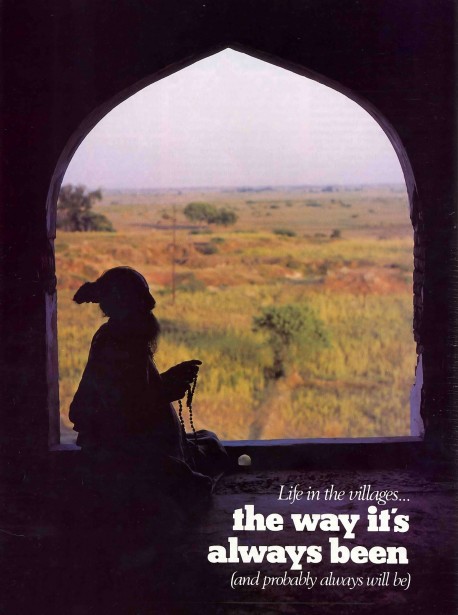
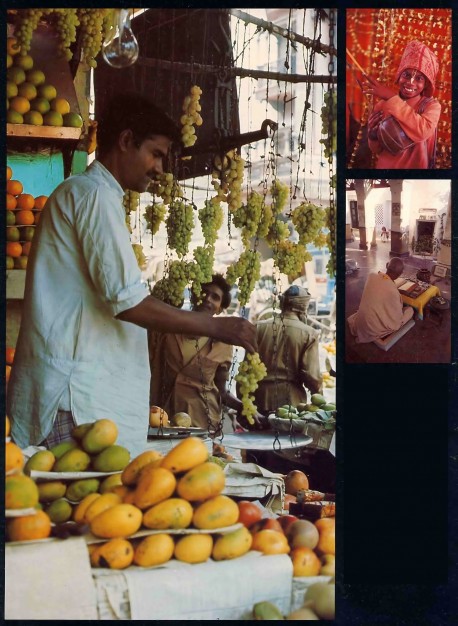
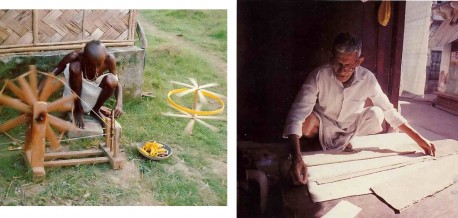
Leave a Reply